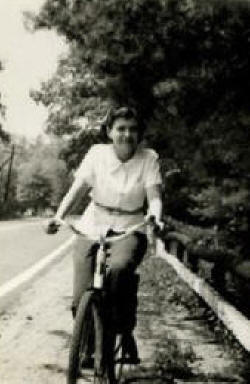 Edith Wynner
(December 22, 1915 - 2003) was a pacifist leader, campaign for World Government; aide to
Rosika Schwimmer; author of study of international organization.
In the early 1930s, Schwimmer moved to New York City, where she lived with her
sister, Franciska, a pianist, and her secretary, Edith Wynner.
Edith Wynner
(December 22, 1915 - 2003) was a pacifist leader, campaign for World Government; aide to
Rosika Schwimmer; author of study of international organization.
In the early 1930s, Schwimmer moved to New York City, where she lived with her
sister, Franciska, a pianist, and her secretary, Edith Wynner.
Edith Wynner was born Edith Weiner on December 22, 1915 in Budapest, Hungary to Frieda Herskovics and Robert Weiner. Her father, a jeweler, left Hungary at the end of World War I for the United States and anglicized the family surname to Wynner; Edith, her mother, and brother, Albert, followed in 1923. Because of her family's travels, including extended visits to family in Czechoslovakia, Wynner was fluent in Hungarian, German, English, Slovak, and French from a young age. The Wynners settled in Chicago, Illinois, where Edith graduated from Theodore Roosevelt High School and was first introduced to Mme. Rosika Schwimmer.
Wynner moved to New York City after high school with the intention of attending Hunter College; however, the effects of the Great Depression forced her to find full-time employment at 19 years old. Because of her language skills and interest in activism, she became secretary to Rosika Schwimmer in 1934. Wynner became closely involved in the issues Schwimmer advocated for, and Schwimmer pushed her to begin delivering small lectures and publishing her writing. In addition to working as Schwimmer's personal secretary, Wynner served as National Secretary of the Griffin-O'Day Bill Committee from 1934 to 1936, and from 1937 to 1941 as New York Secretary and delegate of the Campaign for World Government-which were headed by Schwimmer and her longtime associate,
Lola Maverick Lloyd.
From 1943 to 1944, Wynner and Lloyd's daughter, Georgia Lloyd, researched and wrote Searchlight on Peace Plans: Choose Your Road to World Government, examining peace plans over five centuries in history. Edith Wynner and Georgia Lloyd went on a speaking tour for the book through 1946, which included some international destinations. In 1947, Wynner sailed to England and worked as secretary to Henry Usborne, M.P. and co-founder of the Parliamentary Group for World Government. With Usborne, she attended the 1947 Conference of the World Movement for World Federal Government, and was elected Vice President of the Conference.
Following Rosika Schwimmer's death in 1948, Wynner became Consultant to the Schwimmer-Lloyd collection at the New York Public Library. With Franciska Schwimmer, until her death in 1962, Wynner oversaw all aspects of the collection's administration, including processing, description, access restrictions, reference requests, and preservation. She actively worked to build the collection, securing the papers of Lola Maverick Lloyd's children and meticulously collecting books and printed material on the subjects covered in the collection. Wynner remained the Schwimmer-Lloyd Consultant for many decades, until her illness in the late 1990s.
Wynner continued writing about the need for world peace through world government throughout her life, publishing World Federal Government: Why? What? How? In Maximum Terms in 1954. She regularly engaged in written debate about how best to achieve disarmament and improve the United Nations, with her letters to the editor and essays appeared in publications such as The New York Times, The Wilson Quarterly, and World Peace News. Wynner delivered testimony to Senate and United Nations charter hearings from the 1950s through the 1970s, though she scaled back participation in world government organizations in favor of her research. Wynner's fervor for disarmament and world peace gave her written work a tone that she recognized as unvarnished and biting. She published reviews and essays into the 1990s, often taking to task historians and authors who she felt misrepresented the work of Rosika Schwimmer and the Campaign for World Government.
While working with the Schwimmer-Lloyd collection, Wynner labored on a historical biography she hoped to complete about Rosika Schwimmer's life. Her work on The Life and Times of Rosika Schwimmer spanned over 50 years, but never saw completion.
Edith Wynner died in 2003.
My published books:


BACK TO HOME PAGE

 Edith Wynner
(December 22, 1915 - 2003) was a pacifist leader, campaign for World Government; aide to
Rosika Schwimmer; author of study of international organization.
In the early 1930s, Schwimmer moved to New York City, where she lived with her
sister, Franciska, a pianist, and her secretary, Edith Wynner.
Edith Wynner
(December 22, 1915 - 2003) was a pacifist leader, campaign for World Government; aide to
Rosika Schwimmer; author of study of international organization.
In the early 1930s, Schwimmer moved to New York City, where she lived with her
sister, Franciska, a pianist, and her secretary, Edith Wynner.
